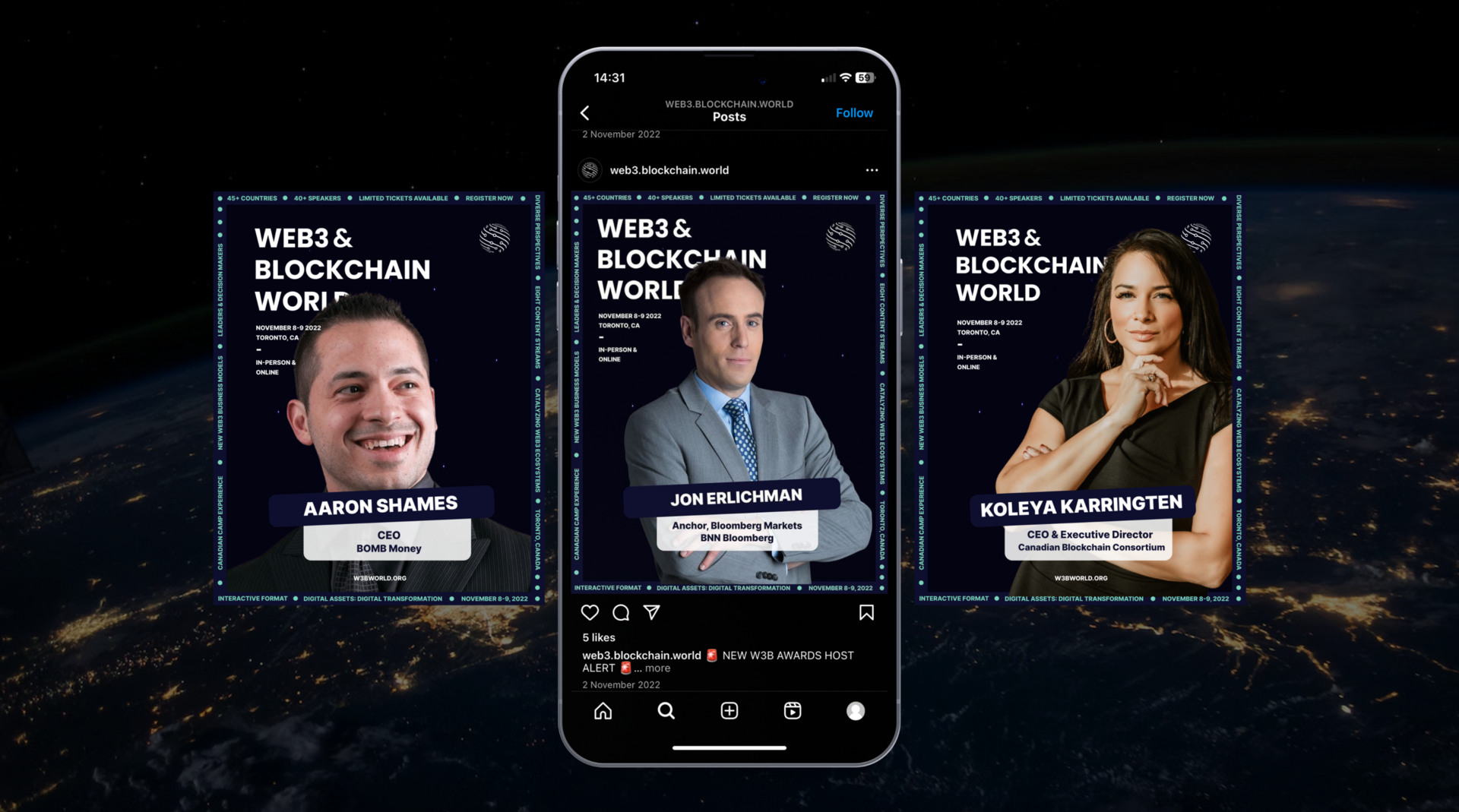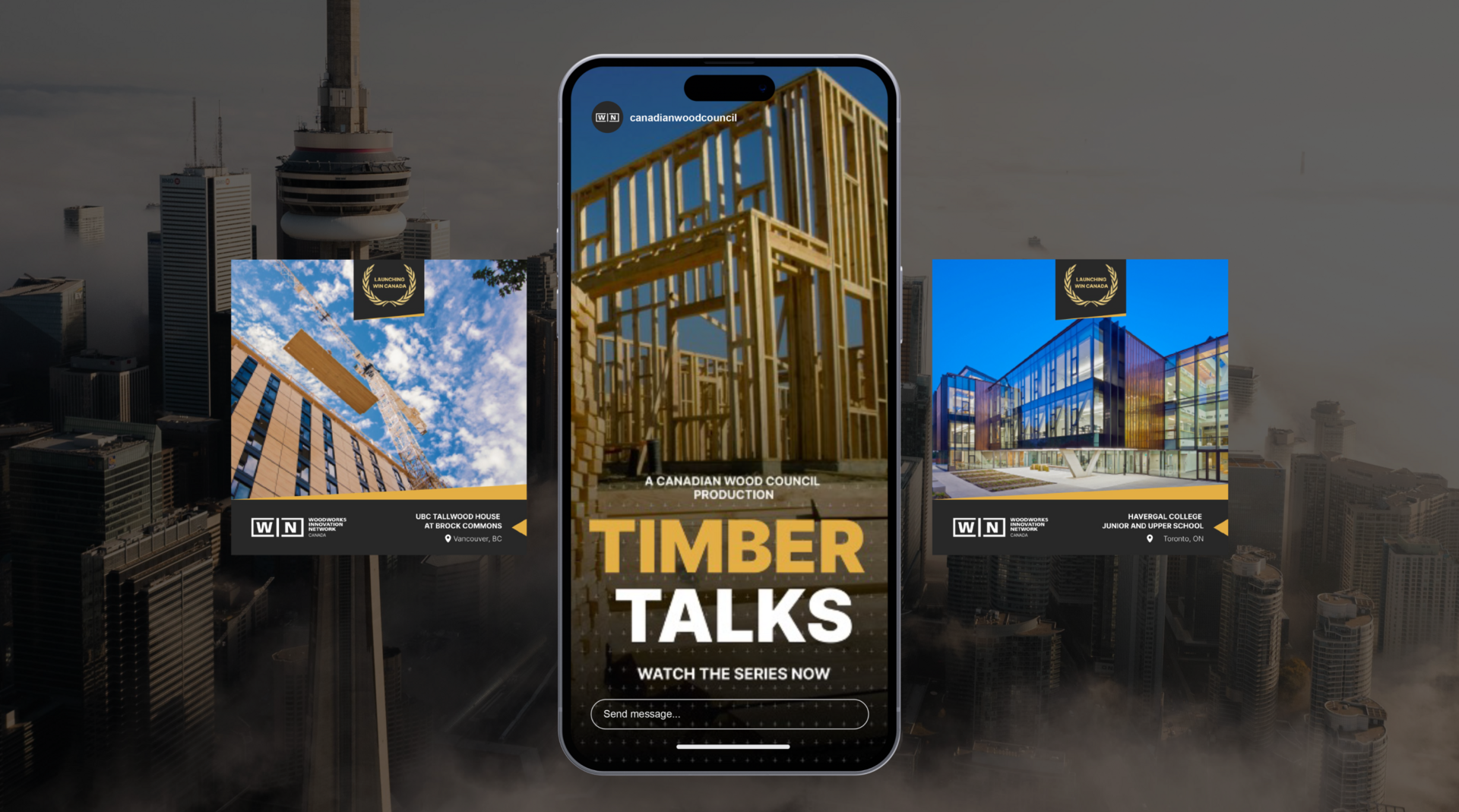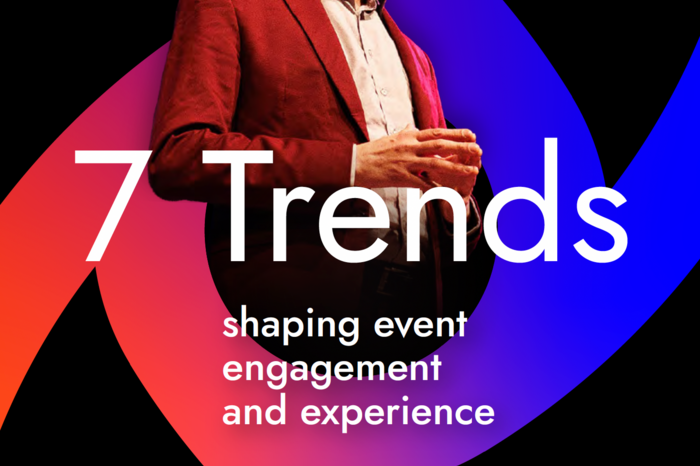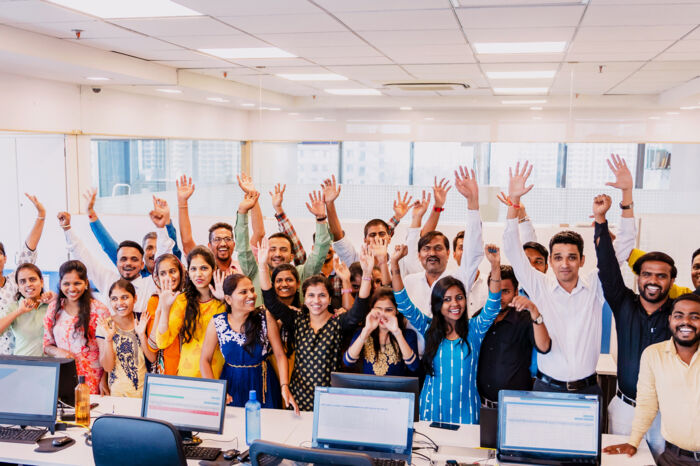
How do you build engagement through digital marketing?
VA: What works in one country is different from every other country. Engaging with Canadians, for example, is a challenge. So for the Web3 and Blockchain World Conference (W3B) in November 2022 we hired mid-size influencers. They received tickets for the event and were able to bring their camera people and do stories at the event but, importantly, once a week in the four- or five-weeks’ build-up to the conference, we’d spotlight one creator who would talk about the latest news in the blockchain space.
Some of these one- or two-minute stories got incredible reach – sometimes 300 comments and thousands of likes. The results were very good and we came very close to selling out the conference.

Another example was launching an online community for The Canadian Wood Council. We invested around $100,000 in paid media with a result of $2.5 million in media exposure – which included segments on ABC and Yahoo’s 20:00 news programme. The campaign received an award two weeks ago.
To build engagement through digital marketing, we create personalised, relevant content that resonates with our audience. Our strategy hinges on understanding our clients' unique stories and audiences, then crafting targeted messages that speak directly to their interests and needs. We leverage a mix of channels — from social media to programmatic advertising we're where our audience is. By analysing data and feedback, we continually refine our approach, creating more meaningful interactions. This strategy not only captures attention but fosters a sense of community and connection, turning passive viewers into active participants and loyal advocates for our clients. This mix of tools, technology and content last year translated to the two largest ever events for two of our MCI Brussels clients, EADV and SCDM.

Please tell us more about the tools MCI uses.
VA: We did an audit in November and found that we have about 20 software tools that we use. For people outside the industry, that may seem like a lot of software but when you look at the state of digital marketing in 2023, you either hire a lot of people to do a lot of repetitive tasks and a lot of developers to do a lot of unnecessary original work, or you have the option of subscribing to tools that give you automation and connection.
While we still need very good copywriters who have the relevant context of the client’s work to create a press release that the target audience will read, a lot of what PR agencies used to do with that press release can now be automated. For example, we have the Woodwork Summit in Vancouver at the moment. We used Prowly to generate a clean database of journalists that report on wood and design. All press liaison – distributing the press release, communicating with the journalists – was automated. We even created rules to automate the follow-ups. If a journalist did not respond to the press release, or opened the press release email but did not publish it, they would automatically receive a follow-up e-mail in three days asking questions like: Do you need more information? Would you like an interview with the President of the Association?
The results we achieved amounted to about USD2.5 million in AVE – to buy that space would cost $2.5 million. Instead they got it for free using about a dozen automation tools.
Of course there’s a lot of coordination necessary when you need to set up. That's the moment that you create the orchestra. Once it’s done, you're the conductor and the tools play the music. But you still need the human touch to control how you're going to play the music.
PZ: At MCI Brussels, our toolkit for digital marketing is both advanced and diverse, ensuring we stay at the forefront of the industry. For advertising, we utilise established platforms like Google AdWords and AdSense, but our technology continually evolves. We incorporate programmatic advertising platforms like DV360, enhancing our reach and precision. Additionally, AI-powered tools like Teads are integral to our strategy, granting us access to premium publishers, including CNN, BBC, and Le Figaro. Beyond advertising, we rely on mainstream tools like HubSpot and Semrush for daily operational support. These tools collectively enable us to deliver targeted, efficient, and impactful marketing campaigns for our clients.

In terms of proving ROI, reach and engagement, how do you measure that?
PZ: We employ a two-pronged approach to measure ROI, reach, and engagement. Primarily, we utilise Google Analytics 4 (GA4) for comprehensive data collection, accounting for about 90% of our insights. This data is then cross-referenced with Looker Studio by Google, ensuring accuracy and depth in our analysis. For the commercial aspect, we benchmark against registration reports from our utilised systems. This dual method allows us to precisely evaluate the effectiveness of our campaigns, ensuring our strategies are not only reaching the intended audience but also driving meaningful engagement and tangible returns.
VA: For registration, we use MCI’s proprietary solutions like EventsAir, though some clients will opt to use their own solutions, for example, Eventbrite and Ticketbud.
For sales performance purposes, we frequently design landing pages. In Canada, we use Unbounce as the main platform. For data visualisation, we use Looker and PowerBI® via MCI’s partnership with Microsoft. Supermetrics allows us to streamline data. DSPs, DMPs, and ad servers work to target and deliver ads effectively, optimising digital advertising campaigns for our clients. When there’s one software update, you might need to update the entire network of software. But at MCI we understand the internal work that needs to be done.

What does MCI bring that makes our offering unique compared to other digital marketing agencies?
VA: Today MCI’s offering is aligned with the best digital agencies out there. I owned my own digital agency and when that was acquired by another company, MCI invited me to join them. I have seen the work that MCI and our partnership agencies like Kabloom do around the world, and we compete on an equal footing with the best. When we meet with clients, we can say with confidence, “We can go beyond what your digital agency was doing before.” And according to the Net Promoter Score (NPS) results, they're very satisfied with the digital solutions we provide.
PZ: MCI Brussels' unique edge in digital marketing lies in our unmatched experience and holistic approach. Unlike agencies focused on commercial products like shoes or soft drinks, our specialisation in event and engagement marketing sets us apart. We boast a comprehensive toolkit, advanced skill sets, and dedicated human resources, enabling us to execute sophisticated campaigns.
Our distinction became especially evident during the shift to digital events, where our reliance on digital marketing for ticket sales accelerated our resource development and refinement. What truly sets us apart is not just access to technology, which is universally available, but our intellectual capabilities and standardised procedures. We follow meticulously crafted steps, combining our extensive experience with informed judgment to deliver results.
At the heart of MCI's success is the human touch. It's our team's collective expertise and personal commitment to excellence that truly differentiates our services and drives our unparalleled success in the digital marketing space.
VA: I agree 100% – MCI has 35 years of data, plus long-serving talent. So you have this solid grounding. But there’s also something very rare that I’ve noticed and that is the capacity of Managing Directors to bring in people with very specific skills as and when they are needed. The mix of people with legacy experience and new people with specific skills is what sets our digital marketing offering apart. Just take MCI Canada: within just two years of initiating our digital marketing portfolio, we've transformed 40% of our accounts into purely digital ones.
There is also a lot of freedom – for sure we have to achieve results but I've worked in many other places where you don't have this level of freedom. It's a culture of learning and engagement and that’s what makes the magic happen. At the end of the day, engagement is what the client needs, and it starts with us. When our team is engaged, it leads to exceptional outcomes for both us and our clients, resulting in increased client satisfaction and confidence in our guidance.
For example, a client came to us two weeks ago, saying they were anxious about ticket sales. And because we are MCI and we do thousands of events every year, we were able to confirm that people are buying tickets closer and closer to the day of the event. They don't buy six months before as in the past. For W3B, 10% of the tickets sold on the day of the event and we had people queuing outside.
So I could go to the client and say, “Look. Stay calm. The tickets will sell.” I showed him the data and broke it down for him. He knew he was receiving reliable information because we are MCI and we have this data because we do this every single day. And sure enough, they're about to sell out.
We are better than other digital agencies when it comes to engagement marketing for associations, societies, corporates and institutions – apart from everything else we do so well, the other digital agencies out there cannot sell tickets like we sell tickets.





